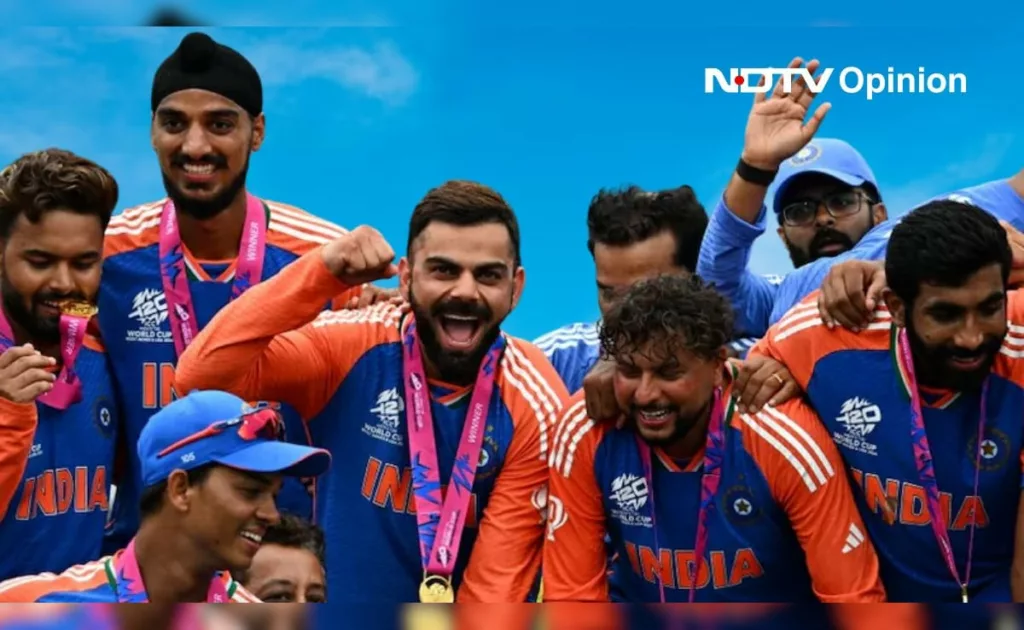A Mouthful of Sky.
A heart rate dangerously above normal.
A pulsating country of 1.5 billion people erupting in joy and frenzy.
Even before India lifted an ICC trophy after a dry spell of 13 years, cricket gave us everything it was supposed to. What happened afterwards is just a matter of minor detail.
But what happens when a country scores a sporting victory? Let’s begin with modifying an adage misattributed to Oscar Wilde. “Everything in human life is really about sex, except sex. Sex is about power.” Everything is about cricket; cricket is about power. Is it any wonder, then, that the United States is now ‘bigly’ interested in cricket?
What This Cup Means To Us
Once we have done celebrating on the streets, hugging strangers in elation, replaying those magical moments of first-class cricket that culminated in a dream-like victory, and writing opinion essays on why this ICC T20 World Cup-winning men’s team is the best in the world, we ought to think a little deeply about what this win means to us. To the pedant, to the mondain, and to the plebian.
Uruguayan writer Eduardo Galeano’s masterpiece on football, Soccer in Sun and Shadow, is a one-stop shop for those meaning to explore the power of sports. “Tell me how you play and I’ll tell you who you are,” says Galeano. His explorations of ‘soccer’ in Latin America reveal everything about the region’s past, present, and even future. Soccer is inextricably linked to the Latin American identity as cricket is to the South Asian. There’s something primordial about it. We do not really see it in the so-called ‘first world’.
This author had her worst sports experience in a city in Scotland – a country with an international cricket team. There’s nothing worse than being the only person familiar with cricket in a country that has played cricket for more than two centuries. The saltiness of India’s defeat in the ICC ODI World Cup (men) final was exacerbated by the fact that the colonisers, who brought us the sport, have moved on totally and completely. They do not see it as a tool to wield their power; it’s up to the Brave New World to do whatever they want with cricket.
Never Just A Game
Caribbean writer CLR James wrote in Beyond a Boundary, “There can be raw pain and bleeding where so many thousands see the inevitable ups and downs of only a game.” For countries like India, cricket can never be just a game, no matter how loud the cynics shout from their ivory towers. A cricket win or loss has consequences for those who are not even in the stadium, physically or metaphorically. West Indies-it’s not a country-predicated its unity principle on the power of cricket. It cannot be trivialised as “just a game”. An acknowledgement of its power is the first step towards rescuing it from the ills that power breeds.
In total contrast with Plato’s conceptualisation of sports – a means to the end of personal virtue, intellectual prowess, and socio-political harmony – victory does not necessarily have a sobering impact on a people. Scholars like Ria Ivandić, Tom Kirchmaier, Yasaman Saeidi, and Neus Torres Blas have recently demonstrated how “in sum, across a wide variety of sports and contexts, domestic abuse is shown to increase following a game”. Yes, there may be public scenes of celebrations with all the generations partaking in the glory of an elusive defeat. There may be momentary egalitarianism manifesting in high-fiving between the Porsche-driving elite and the balloon-selling vendors.
A Dramatic Victory, A Terrible Beauty
There’s nothing more satisfying than a dramatic victory. “To win without magic, without surprise or beauty, isn’t that worse than losing?” Galeano says so about football victories. With a dramatic sports victory, a terrible beauty is born. How much terror it should be allowed to unleash is a matter for a functioning republic to assess. India has recognised the potential of cricket to nurture a national identity – career politicians have actively engaged with the sport’s management and exploited its promise. Cricketers have dabbled in realpolitik, too. It’s all fair game.
India’s present moment of cricketing glory has come from Barbados. It is the place where one of the most significant controversies, with overlaps of colonialism, identity, and cricket erupted twenty-five years ago. Lloyd Barker, a West Indian umpire, was accused by BBC correspondent Christopher Martin Jenkins of capitulating under West Indies captain Viv Richards’s appeal and wrongly dismissing Robert Bailey during the England-West Indies Test series in 1990. Barbados erupted in protest against this affront to the Caribbean culture and character.
The history of cricket in India must undertake what Galeano says in the context of football: “a sad voyage from beauty to duty”. India has a duty to – and only India can – protect cricket’s beauty.
(Nishtha Gautam is a Delhi-based author and academic.)
Disclaimer: These are the personal opinions of the author
